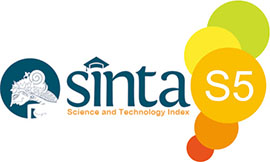PENGEMBANGAN SIKAP SOSIAL DENGAN METODE BERMAIN BAGI ANAK TAMAN KANAK-KANAK
 ),
), (1)
 Corresponding Author
Corresponding Author
DOI : https://doi.org/10.24036/et.v7i2.107192
Full Text:
 Language : id
Language : id
Abstract
This study aims to determine the development of social attitudes using play methods. This type of research is literature study. The method used is the study of literature, data collection techniques by conducting a study of the review of books, literature, records, and reports related to the problem being solved. Researchers conduct studies relating to theories related to the research topic, gathering as much information from the literature relating to the development of social attitudes with play methods. The result is social behavior namely imitating behavior, competitive behavior, cooperation, sympathy, empathy, social support, sharing, and familiar behavior. All of these behaviors are developed through play. For that the dimensions of the game that can develop children's social abilities are as follows: (1) Playing solitary, meaning playing alone without friends (2) Playing in parallel, meaning that the activity of playing is done by a group of children using the same plaything but each children play alone, (3) Play associatively means that children play in the same game and with the same rules, (4) Play cooperatively means that each child has a certain role in order to achieve the goal of playing. The game used can be traditional games or games that are assisted by learning media and other educational games
References
Anthony, L. G., Anthony, B. J., Granville, D. N., Naiman, D. Q., Waanders, C., & Shaffer, S. (2005). 'The relationships between parenting stress, parenting behavior and preschoolers' social competence and behavior problems in the classroom'. Infant the Child Development. 14: 133-154.
Ekinci V. D., & GLiqimsek, I. (2009). `Okul oncesi egitimde aile katilimli sosyal beceri egitim' [Social skills training with family involvement in preschool education]. Newsa: E-Journal of New World Sciences Academy, 4(3): 11101122
Goleman, Daniel. (1997). Kecerdasan Emosional. Jakarta : PT Gramedia Pustaka Utama
Hurlock B. Elisabeth. 1978. Perkembangan Anak Jilid 2. Jakarta : Erlangga.
Isjoni. (2013). Cooperative Learning: Efektifitas Pembelajaran Kelompok. Bandung: Alfabeta.
Iim dan Marlina. (2019). Perilaku Sosial Anak Usia 5-6 Tahun di Taman Kanak-Kanak Ekasakti Kota Padang. Indonesian Journal of Islamic Early Childhood Education. Ijiece, Vol. 4, No. 1, June 2019 (1-8)
Matson, Jhonny L & Thomas H. Ollendick. (1988). Enhancing Children’s Social Skill: Assessment and Training. New York: Pergamon Press
Marlina, Serli. 2014. Peningkatan Sikap Sosial Anak Usia Dini Melaui Permainan Puzzle Buah di taman Kanak-Kanak Aisyiyah 1 BukitTinggi. Padang: Jurnal Ilmiah Ilmu Pendidikan Volume XVI No 2
Moeslichatoen. 2004. Metode Pengajaran Di Taman Kanak-Kanak. Jakarta: Asdi Mahasatya.
Nazir, Moh. (2013). Metode Penelitian. Bogor: Ghalia Indonesia.
Permendikbud Nomor 146 Tahun 2014 Tentang Kurikulum 2013 Pendidikan Anak Usia Dini
Yusuf, Syamsu. 2009. Psikologi Perkembangan Anak dan Remaja. Bandung: Rosda
Zed, Mestika, 2008.Metode Penelitian kepustakaan, Jakarta : Yayasan Obor Indonesia.
 Article Metrics
Article Metrics
 Abstract Views : 245 times
Abstract Views : 245 times
 XML (Bahasa Indonesia) Downloaded : 0 times
XML (Bahasa Indonesia) Downloaded : 0 times
Refbacks
- There are currently no refbacks.





